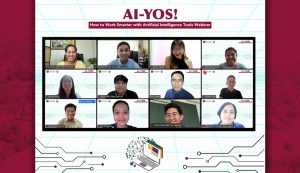
The UPLB Learning Resource Center (UPLB LRC) held a webinar entitled “AI-Yos! How to Work Smarter with Artificial Intelligence Tools” on March 4 via online conferencing and live streaming on Facebook.
The event aimed to help educators and students understand how to maximize the benefits of artificial intelligence (AI), the ethical use of AI, and the future of AI tools in the education sector.
The webinar, moderated by Sheryl Edd Hermosa-Ebron, University Extension Associate, featured four sessions on different aspects of AI in education.
In the first session, “AI-yan Na! How Artificial Intelligence is Changing the Education Sector,” Dr. Eugene Rex L. Jalao, coordinator of the Artificial Intelligence Program at UP Diliman, emphasized the importance of investing in AI education. He encouraged students to take AI subjects.
“We all need to invest in AI! If you’re a student, take AI subjects. You will be able to use these AI tools in the future and know their advantages and disadvantages,” Dr. Jalao said.
The second session, “Are We R-AI-dy? How to Develop Competencies in the Artificial Intelligence Era,” was conducted by Dr. Marie Grace A. Gomez, a professor at the College of Education at UP Diliman. She discussed developing competencies in the AI era and the importance of being responsible digital citizens.
“We have a wonderful online community. We have wonderful developments in technology, particularly in the field of AI. But we must always remember that we should be responsible digital citizens.”
The third session, “AI-yos lang ba? How to Ensure the Ethical Use of AI in Learning and Teaching,” focused on the ethical use of AI in both learning and teaching and was moderated by Krissah Marga Taganas, head of the Philosophy Division of the Department of Humanities, College of Arts and Sciences at UPLB. She emphasized the ethics behind using AI tools and the need to upskill and adopt AI.
“Whether we like it or not. Whether we resist it or not, we need to upskill and adapt. We need to recognize first that AI will be here to stay,” Taganas pointed out.
She also discussed the potential effects of AI on both education and society. She said,
“when you want to move forward with these issues, navigating these ethical issues, we need to ask how this will shape our educational systems and our lives in the future.”
In the final session, “What’s the AI-mpact? How to imagine the future of Education with AI tools,” moderators Dr. Mark Oliver Llangco, UPLB General Education Program director, and Dr. Elenita Que, faculty member and program coordinator of the Educational Technology Area at the UP College of Education, along with the other resource persons, discussed how to imagine the future of education with AI tools.
Student Hanz Benedic Aguilar, a BS Biology major, expressed concern about the potential consequences of abusing AI systems.
“I think of its danger. Relating to (AI) systems that we have today, we might abuse it, leading to various consequences,” he said.
The webinar ended with closing remarks given by John Mervin L. Embate, director of the UPLB LRC.
Embate highlighted the flexibility and adaptability of the education system, emphasizing the need to integrate new technologies and learning models to enhance the learning experience.
Embate said, “I think the beauty of our education system is that it’s flexible and adaptive. And through that, we could integrate these technologies and new learning models, not only to adapt to the changing social context but also to enhance and enrich the learning experience.”
“Let’s confront this paradigm shift in education and refrain from the way that we see education and the role of artificial intelligence in general,” Embate added.
The webinar participants gained valuable insights into the importance of AI in education and how to use AI tools responsibly. The UPLB LRC is committed to providing opportunities for continued learning and development in the field of AI.
(This article, written by Vonne Carl Malabrigo & Sheryl Edd P. Heromosa-Ebron, was first published in the UP Los Baños website on 26 March 2023)
